| Listing 1 - 10 of 23 | << page >> |
Sort by
|
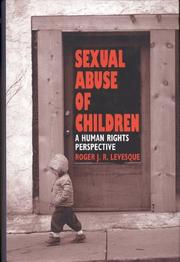
ISBN: 0253334713 9780253334718 Year: 1999 Publisher: Indianapolis (Ind.) Indiana university press
Abstract | Keywords | Export | Availability | Bookmark
 Loading...
Loading...Choose an application
- Reference Manager
- EndNote
- RefWorks (Direct export to RefWorks)
Abus sexuels d'enfants --- Abus sexuels sur des enfants --- Abus sexuels sur les mineurs --- Abus sexuels à l'égard des enfants --- Agression sexuelle des enfants --- Child molestation --- Child molesting --- Child rights --- Child sexual abuse --- Children -- Civil rights --- Children -- Law and legislation --- Children's human rights --- Children's rights --- Children's rights -- Law and legislation --- Crimes sexuels sur des enfants --- Droit de l'enfant --- Droits de l'enfant --- Droits des enfants --- Enfants -- Droit et législation --- Enfants -- Droits --- Enfants -- Exploitation sexuelle --- Enfants [Crimes sexuels sur des ] --- Exploitation sexuelle d'enfants --- Exploitation sexuelle des enfants --- Kinderen -- Recht en wetgeving --- Kinderen -- Rechten --- Kinderen -- Seksuele exploitatie --- Kinderen [Seksuele misdrijven op ] --- Kinderrechten --- Molestation of children --- Molesting of children --- Rechten van het kind --- Rechten van kinderen --- Rights of children --- Rights of the child --- Seksuele exploitatie van kinderen --- Seksuele misdrijven op kinderen --- Sexual abuse of children --- Sexual child abuse --- Sévices sexuels à l'égard des enfants --- Child sexual abuse. --- Children's rights. --- 186.4 Jeugdwerk --- Children --- Human rights --- Child abuse --- Sex crimes --- Civil rights --- Law and legislation --- Legal status, laws, etc.
Book
ISBN: 1441916946 1441916954 1441916962 Year: 2011 Publisher: New York : Springer,
Abstract | Keywords | Export | Availability | Bookmark
 Loading...
Loading...Choose an application
- Reference Manager
- EndNote
- RefWorks (Direct export to RefWorks)
The Encyclopedia of Adolescence breaks new ground as an important central resource for the study of adolescence. Comprehensive in breath and textbook in depth, the Encyclopedia of Adolescence – with entries presented in easy-to-access A to Z format – serves as a reference repository of knowledge in the field as well as a frequently updated conduit of new knowledge long before such information trickles down from research to standard textbooks. By making full use of Springer’s print and online flexibility, the Encyclopedia is at the forefront of efforts to advance the field by pushing and creating new boundaries and areas of study that further our understanding of adolescents and their place in society. Substantively, the Encyclopedia draws from four major areas of research relating to adolescence. The first broad area includes research relating to "Self, Identity and Development in Adolescence". This area covers research relating to identity, from early adolescence through emerging adulthood; basic aspects of development (e.g., biological, cognitive, social); and foundational developmental theories. In addition, this area focuses on various types of identity: gender, sexual, civic, moral, political, racial, spiritual, religious, and so forth. The second broad area centers on "Adolescents’ Social and Personal Relationships". This area of research examines the nature and influence of a variety of important relationships, including family, peer, friends, sexual and romantic as well as significant nonparental adults. The third area examines "Adolescents in Social Institutions". This area of research centers on the influence and nature of important institutions that serve as the socializing contexts for adolescents. These major institutions include schools, religious groups, justice systems, medical fields, cultural contexts, media, legal systems, economic structures, and youth organizations. "Adolescent Mental Health" constitutes the last major area of research. This broad area of research focuses on the wide variety of human thoughts, actions, and behaviors relating to mental health, from psychopathology to thriving. Major topic examples include deviance, violence, crime, pathology (DSM), normalcy, risk, victimization, disabilities, flow, and positive youth development.
Social Sciences --- Psychology --- Adolescence --- Teenagers --- Adolescents --- Teen-agers --- Teens --- Young adults (Teenagers) --- Teen-age --- Development --- Psychology. --- Psychiatry. --- Educational sociology. --- Sociology. --- Education and sociology. --- Sociology, Educational. --- Child psychology. --- School psychology. --- Developmental psychology. --- Child and School Psychology. --- Developmental Psychology. --- Criminology and Criminal Justice, general. --- Sociology, general. --- Sociology of Education. --- Youth --- Puberty --- Criminology. --- Crime --- Social sciences --- Criminals --- Medicine and psychology --- Mental health --- Psychology, Pathological --- Development (Psychology) --- Developmental psychobiology --- Life cycle, Human --- Study and teaching --- Education and sociology --- Social problems in education --- Society and education --- Sociology, Educational --- Sociology --- Education --- Social theory --- Psychology, School --- Psychology, Applied --- Behavior, Child --- Child behavior --- Child study --- Children --- Pediatric psychology --- Child development --- Developmental psychology --- Aims and objectives --- School Psychology. --- Adolescent psychology
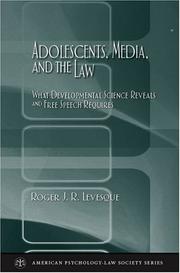
ISBN: 9780195320442 0195320441 Year: 2007 Publisher: Oxford New York Oxford University Press
Abstract | Keywords | Export | Availability | Bookmark
 Loading...
Loading...Choose an application
- Reference Manager
- EndNote
- RefWorks (Direct export to RefWorks)
Mass media and youth --- Teenagers --- Mass media --- Adolescent Behavior --- Adolescent --- Adolescent Development --- Attitude --- Civil Rights --- Mass Media --- #SBIB:309H402 --- #SBIB:309H1015 --- Broadcast Media --- Folk Media --- Printed Media --- Media, Broadcast --- Media, Folk --- Media, Mass --- Media, Printed --- Equal Protection --- Legal Rights --- Voting Rights --- Due Process --- Civil Right --- Legal Right --- Protection, Equal --- Right, Civil --- Right, Legal --- Right, Voting --- Rights, Civil --- Rights, Legal --- Rights, Voting --- Voting Right --- Human Rights --- Race Relations --- Social Justice --- Attitudes --- Intention --- Adolescents --- Adolescents, Female --- Adolescents, Male --- Teens --- Adolescence --- Youth --- Adolescent, Female --- Adolescent, Male --- Female Adolescent --- Female Adolescents --- Male Adolescent --- Male Adolescents --- Teen --- Teenager --- Youths --- Minors --- Behavior, Adolescent --- Adolescent Behaviors --- Behaviors, Adolescent --- Development, Adolescent --- Attitudes. --- Social aspects --- psychology --- legislation & jurisprudence --- Media en publiekgroepen: gebruik van de boodschap, effecten van de media, ... --- Media: politieke, juridische, ethische, ideologische aspecten (incl. privacy) --- Opinions --- Opinion --- Media en publiekgroepen: gebruik van de boodschap, effecten van de media, .. --- Minority Rights --- Minority Right --- Right, Minority --- Rights, Minority --- Media en publiekgroepen: gebruik van de boodschap, effecten van de media, . --- Media en publiekgroepen: gebruik van de boodschap, effecten van de media, --- Communication --- Télévision --- Législation --- Influence --- Agressivité --- Violence --- Apparence physique --- Tabagisme --- Comportement sexuel --- media
Book
ISBN: 3319415336 3319415352 Year: 2016 Publisher: Cham : Springer International Publishing : Imprint: Springer,
Abstract | Keywords | Export | Availability | Bookmark
 Loading...
Loading...Choose an application
- Reference Manager
- EndNote
- RefWorks (Direct export to RefWorks)
This book reviews broad social changes affecting youth development and the inconsistency of the legal system in updating its approach to adolescents’ rights. Legal experts examine current adolescent protections and offer research-based proposals for revising laws that underserve or criminalize youth under the rubric of protection. Focusing on the key areas of technology and media, education, and personal relationships, chapters discuss legal responses to a range of challenges impacting young people, including sexual exploitation, the right to privacy, military family issues, and the school-to-prison pipeline. The book’s nuanced concept of legal protection credits youth with greater competence than currently afforded, in hope that adolescents can take more ownership of their evolving lives in a rapidly changing society. Topics featured in this volume include: How to balance freedom of expression with adolescents’ right to data protection. The sexualization of media and its effects on youth attitudes and behaviors. The rising phenomenon of teenage sexting. Protecting students’ sexual identity in private schools. Youth sex and labor trafficking and possible solutions to alleviate the widespread crime. Adolescents, Rapid Social Change, and the Law is a must-have resource for researchers and professors, clinicians and related professionals as well as graduate students in developmental psychology, family studies, public health, educational policy and politics, and social policy.
Psychology. --- Public health. --- Educational policy. --- ducation and state. --- Families. --- Families --- Developmental psychology. --- Developmental Psychology. --- Family. --- Public Health. --- Educational Policy and Politics. --- Social aspects. --- Development (Psychology) --- Developmental psychobiology --- Psychology --- Life cycle, Human --- Families—Social aspects. --- Education and state. --- Education --- Education policy --- Educational policy --- State and education --- Social policy --- Endowment of research --- Community health --- Health services --- Hygiene, Public --- Hygiene, Social --- Public health services --- Public hygiene --- Social hygiene --- Health --- Human services --- Biosecurity --- Health literacy --- Medicine, Preventive --- National health services --- Sanitation --- Family --- Family life --- Family relationships --- Family structure --- Relationships, Family --- Structure, Family --- Social institutions --- Birth order --- Domestic relations --- Home --- Households --- Kinship --- Marriage --- Matriarchy --- Parenthood --- Patriarchy --- Government policy --- Social aspects --- Social conditions
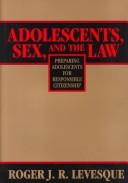
ISBN: 1557986096 Year: 2000 Publisher: [Place of publication not identified] American Psychological Association
Abstract | Keywords | Export | Availability | Bookmark
 Loading...
Loading...Choose an application
- Reference Manager
- EndNote
- RefWorks (Direct export to RefWorks)
Sex and law --- Teenagers --- Legal status, laws, etc. --- Legal status, laws, etc --- Adolescents --- Teen-agers --- Teens --- Young adults (Teenagers) --- Youth --- Law - U.S. - General --- Law - U.S. --- Law, Politics & Government
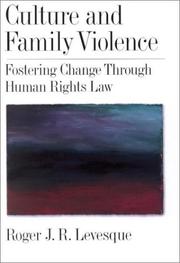
ISBN: 1557986827 Year: 2001 Publisher: Washington (D.C.): American psychological association
Abstract | Keywords | Export | Availability | Bookmark
 Loading...
Loading...Choose an application
- Reference Manager
- EndNote
- RefWorks (Direct export to RefWorks)
Culture and law --- Family violence --- Human rights --- Basic rights --- Civil rights (International law) --- Rights, Human --- Rights of man --- Human security --- Transitional justice --- Truth commissions --- Domestic relations --- Violence (Law) --- Law and culture --- Law --- Law and legislation --- Criminal provisions --- Culture and law. --- Human rights. --- Law and legislation.
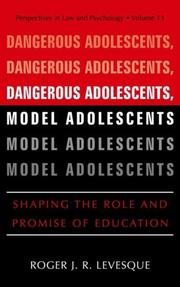
ISBN: 1280200278 9786610200276 0306475405 0306467674 Year: 2002 Publisher: New York : Kluwer Academic/Plenum,
Abstract | Keywords | Export | Availability | Bookmark
 Loading...
Loading...Choose an application
- Reference Manager
- EndNote
- RefWorks (Direct export to RefWorks)
Teachers make a difference. As someone who grew up in one of the po- est and rural areas of a poor state and ended up attending elite graduate and professional schools, I have much to credit my public school teachers. My teachers sure struggled much to teach an amazingly wide variety of students from different backgrounds, abilities, and hopes. Given that re- ity, which undoubtedly repeats itself across the United States and globe, one would think that I should be quite hesitant to criticize a system that produces countless grateful students and productive citizens. I agree. The pages that follow surely can be perceived as yet another attack on already much maligned schools that do produce impressive outcomes despite their limited resources, increased obligations, and the sustained barrage of attacks from competing interest groups. Some may even view the text as an affront to the inalienable rights of parents to raise their children as they see fit. Others surely could understand the analysis as another assault on our decentralized legal and school systems that should retain the right to balance the needs of communities, parents, schools, and students. I clearly did not intend, and do not see the ultimate result, as yet another diatribe on the manner teachers, parents and communities treat students.
Education, Secondary --- Teenagers --- Problem children --- Educational law and legislation --- Social aspects --- Education --- Law --- Psychology, clinical. --- Law and Psychology. --- Education, general. --- Clinical Psychology. --- Psychological aspects. --- Clinical psychology. --- Psychology. --- Education. --- Psychiatry --- Psychology, Applied --- Psychological tests --- Children --- Education, Primitive --- Education of children --- Human resource development --- Instruction --- Pedagogy --- Schooling --- Students --- Youth --- Civilization --- Learning and scholarship --- Mental discipline --- Schools --- Teaching --- Training --- Behavioral sciences --- Mental philosophy --- Mind --- Science, Mental --- Human biology --- Philosophy --- Soul --- Mental health --- Difficult children --- Maladjusted children --- Behavior disorders in children --- Adolescents --- Teen-agers --- Teens --- Young adults (Teenagers) --- High school education --- High school students --- Secondary education --- Secondary schools --- High schools --- Education (Secondary)
Book
ISBN: 3030266397 3030266389 Year: 2019 Publisher: Cham : Springer International Publishing : Imprint: Springer,
Abstract | Keywords | Export | Availability | Bookmark
 Loading...
Loading...Choose an application
- Reference Manager
- EndNote
- RefWorks (Direct export to RefWorks)
This textbook offers a foundation for understanding adolescents’ rights by articulating the complexity, breadth, and challenging nature of laws regulating adolescents. It showcases the Supreme Court’s key interpretations of the Constitution as it relates to adolescents’ rights. Chapters examine relevant legal systems and the social contexts that legal systems control. In addition, chapters discuss constitutional issues and their nuances through actual cases that often offer alternative interpretations of constitutional rules. The textbook guides readers through both well accepted and often ignored conceptions of adolescents’ rights. It offers readers unfamiliar with the law the tools they need to understand the importance of adolescents’ constitutional rights and how they can contribute to developing them. Topics featured in this text include: The role of parents and family systems in conceptualizing adolescents’ rights. The complexities of providing health care to adolescents. Religious freedom and adolescents’ rights relating to religion. The flaws of child welfare systems. The challenge of developing rights specifically for juveniles and delinquent youth. Juvenile court systems and the differential treatment of adolescents. The difference between the juvenile court system and the criminal court system. Adolescents’ media rights. Adolescents and Constitutional Law is an essential textbook for graduate students as well as a must-have reference for researchers/professors and related professionals in developmental psychology, juvenile justice/youth offending, social work, psychology and law, family studies, constitutional law, and other interrelated disciplines.
Constitutional law. --- Constitutional law --- Constitutional limitations --- Constitutionalism --- Constitutions --- Limitations, Constitutional --- Public law --- Administrative law --- Interpretation and construction --- Developmental psychology. --- Juvenile delinquents. --- Social work. --- Developmental Psychology. --- Youth Offending and Juvenile Justice. --- Social Work. --- Benevolent institutions --- Philanthropy --- Relief stations (for the poor) --- Social service agencies --- Social welfare --- Social work --- Human services --- Delinquents --- Delinquents, Juvenile --- Juvenile offenders --- Offenders, Juvenile --- Offenders, Youthful --- Young offenders --- Youthful offenders --- Criminals --- Youth --- Development (Psychology) --- Developmental psychobiology --- Psychology --- Life cycle, Human
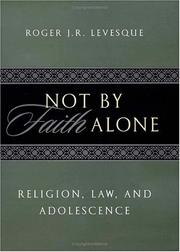
ISBN: 0814765157 0585480672 9780585480671 9780814751824 0814751822 9780814765159 Year: 2002 Publisher: New York, NY
Abstract | Keywords | Export | Availability | Bookmark
 Loading...
Loading...Choose an application
- Reference Manager
- EndNote
- RefWorks (Direct export to RefWorks)
Teens are often seen as challenging social mores. They are frequently perceived to engage in activities considered by adults to be immoral, including sexual behavior, delinquent activities, and low-level forms of violence. Yet the vast majority report surprisingly high levels of religiosity. Ninety-five percent of American teens aged 13-17 believe in God or a universal spirit, and 76% believe that God observes their actions and rewards or punishes them. Nearly half engage in religious practices, such as praying alone or attending church or synagogue services. Adolescents' religious beliefs are clearly important to them. Yet, the law does not know how to approach adolescents' religious rights and needs. In Not by Faith Alone, Roger J. R. Levesque argues that teens' search for meaning does not always serve adolescents or society well. Religious doctrines and institutions are not all "good," with violence linked to religious beliefs, for example-particularly racial/ethnic and sexual orientation harassment-becoming an increasing concern. Not by Faith Alone is the first attempt to integrate research on the place of religion in adolescent development and to discuss the relevance of that research for policies and laws which regulate religion in their lives. Levesque asks how religion, broadly defined, influences the development of teens' inner moral compasses, and how we can ensure that religion and the apparent need for "religious" activity lead to positive outcomes for individual adolescents and for society.
Teenagers --- Children's rights --- Freedom of religion --- Adolescents --- Teen-agers --- Teens --- Young adults (Teenagers) --- Youth --- Religious life --- Civil rights
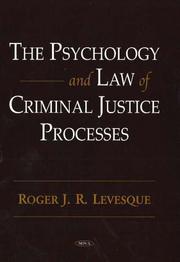
ISBN: 162100757X 9781621007579 1594543127 9781594543128 Year: 2006 Publisher: New York
Abstract | Keywords | Export | Availability | Bookmark
 Loading...
Loading...Choose an application
- Reference Manager
- EndNote
- RefWorks (Direct export to RefWorks)
Criminal justice, Administration of --- Criminal psychology. --- Criminal psychiatry --- Criminals --- Psychology, Criminal --- Criminal anthropology --- Psychology --- Psychology, Pathological --- Administration of criminal justice --- Justice, Administration of --- Crime --- Criminal law --- Psychological aspects. --- Law and legislation
| Listing 1 - 10 of 23 | << page >> |
Sort by
|

 Search
Search Feedback
Feedback About UniCat
About UniCat  Help
Help News
News